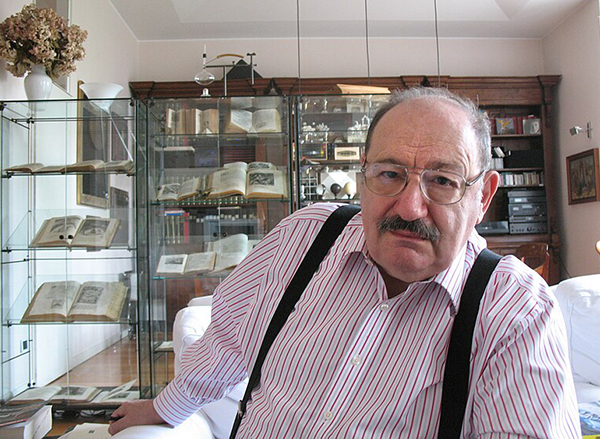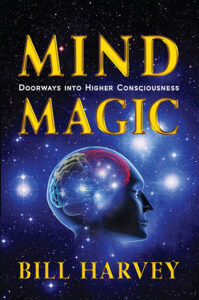Welcome to this week’s Bill Harvey Blog: July 26, 2024

Umberto Eco at his home.*
The Italian novelist, essayist, deep thinker Umberto Eco won first prize in a Fascist essay contest when he was ten years old. He was a product of his culture: Mussolini’s Italy was all he ever knew up until that point. That was reality. Fascism was his way of life, although not consciously. He had no inkling of other worlds then. The year was 1942.
Less than a year later on the morning of April 27, 1943 he learned from a radio broadcast that “Fascism had collapsed and Mussolini had been arrested.” (Five Moral Pieces) He ran out and looked at the headlines on the suddenly large numbers of newspapers and saw that political parties that must have existed in secret were all coming out. Until that moment he had believed that every country had just one party and in Italy it was the Fascist party.
“My God, I had never read words like ‘freedom’ or ‘dictatorship’ in all my life. By virtue of these words, I was reborn as a free Western man.”
Eco having been conditioned as a Fascist was released from that condition by outside forces and uplifted. He became a teacher, philosopher, scientist, best-selling novelist.
His concept of semiotics permits us to read the signs in all things since all things may be interpreted as signs in themselves. We all constantly create signs, both intentionally and without conscious intent. This was his unique perspective on the nature of reality.
In Five Moral Pieces he dissects fascism in its broader sense (i.e. not limited to Italy’s version) into a specific set of attributes. This is relevant because he was a person born into fascism and took it for granted as part of life. He experienced liberation by the Allies and the transformation of the way of life. His mind changed and he much preferred the new social contract and its freedoms. He realized himself as a passionate supporter of diversity.
Eco provides the following list of clues to help humanity detect fascism:
- “The cult of tradition“. When all truth has already been revealed by tradition, no new learning can occur.
- “The rejection of modernism“, which views the rationalistic development of Western culture since the Enlightenment as a descent into depravity.
- “The cult of action for action’s sake“, which dictates that action is of value in itself and should be taken without intellectual reflection. This, says Eco, is connected with anti-intellectualism and irrationalism, and often manifests in attacks on modern culture and science.
- “Disagreement is treason” – fascism devalues intellectual discourse and critical reasoning as barriers to action.
- “Fear of difference“, which fascism seeks to exploit and exacerbate, often in the form of racism or an appeal against foreigners and immigrants.
- “Appeal to a frustrated middle class“, fearing economic pressure from the demands and aspirations of lower social groups.
- “Obsession with a plot” and the hyping-up of an enemy threat. This often combines an appeal to xenophobia with a fear of disloyalty and sabotage from marginalized groups living within the society. Eco also cites Pat Robertson‘s book The New World Order as a prominent example of a plot obsession.
- Fascist societies rhetorically cast their enemies as “at the same time too strong and too weak“. On the one hand, fascists play up the power of certain disfavored elites to encourage in their followers a sense of grievance and humiliation. On the other hand, fascist leaders point to the decadence of those elites as proof of their ultimate feebleness in the face of an overwhelming popular will.
- “Pacifism is trafficking with the enemy” because “life is permanent warfare” – there must always be an enemy to fight.
- “Contempt for the weak“, which is uncomfortably married to a chauvinistic popular elitism, in which every member of society is superior to outsiders by virtue of belonging to the in-group. Eco sees in these attitudes the root of a deep tension in the fundamentally hierarchical structure of fascist polities, as they encourage leaders to despise their underlings, up to the ultimate leader, who holds the whole country in contempt for having allowed him to overtake it by force.
- “Everybody is educated to become a hero“, which leads to the embrace of a cult of death.
- “Machismo“, which sublimates the difficult work of permanent war and heroism into the sexual sphere. Fascists thus hold “both disdain for women and intolerance and condemnation of nonstandard sexual habits, from chastity to homosexuality”.
- “Selective populism” – the people, conceived monolithically, have a common will, distinct from and superior to the viewpoint of any individual. As no mass of people can ever be truly unanimous, the leader holds himself out as the interpreter of the popular will (though truly he alone dictates it). Fascists use this concept to delegitimize democratic institutions they accuse of “no longer represent[ing] the voice of the people”.
- “Newspeak” – fascism employs and promotes an impoverished vocabulary in order to limit critical reasoning.
Thanks to Wikipedia for distilling these attributes, which saved me time; I have condensed the Wikipedia listing.
Eco published his essay on this subject in 1995. On July 11, 2024, another great writer and thinker, David Brooks wrote an essay in The New York Times aimed at understanding why America today is not repelled by the idea of authoritarianism. His conclusion is that, until the 1960s, America had a balance between reason and religion which, while disagreeing on one level, agreed upon the moral and ethical grounds for conduct. Then, starting in the 1960s, America began to become less religious, and reason and science on their own did not present as compelling a case for upholding idealistic values:
“At the same time, science and reason failed to produce a substitute moral order that could hold the nation together. By 1981, in the famous first passage of his book “After Virtue,” the philosopher Alasdair Macintyre argued that we had inherited fragments of moral ideas, not a coherent moral system to give form to a communal life, not a solid set of moral foundations to use to settle disputes. Moral reasoning, he wrote, had been reduced to “emotivism.” If it feels right, do it. In 1987, Allan Bloom released his megaselling “The Closing of the American Mind,” arguing that moral relativism had become the dominant ethos of the era.”
“In other words, Americans lost faith in both sides of the great historical tension, and with it the culture that had long held a diverse nation together. By the 21st century it became clear that Americans were no longer disagreeing with one another; they didn’t even perceive the same reality. You began to hear commencement speakers declare that each person has to live according to his or her own truth. Critics talked about living in a post-truth society. [James Davison] Hunter talks about cultural exhaustion, a loss of faith, a rising nihilism — the belief in nothing. As he puts it, ‘If there is little or no common political ground today, it is because there are few if any common assumptions about the nature of a good society that underwrite a shared political life.’”
“Was there anything that would fill this void of meaning? Was there anything that could give people a shared sense of right and wrong, a sense of purpose? It turns out there was: identity politics. People on the right and the left began to identify themselves within a particular kind of moral story. This is the story in which my political group is the victim of oppression and other groups are the oppressors. For people who feel they are floating in a moral and social vacuum, this story provides a moral landscape — there are those bad guys over there and us good guys over here. The story provides a sense of belonging. It provides social recognition. By expressing my rage, I will earn your attention and respect.”
“The problem with this form of all-explaining identity politics is that it undermines democracy. If others are evil and out to get us, then persuasion is for suckers. If our beliefs are defined by our identities and not individual reason and personal experience, then different Americans are living in different universes and there is no point in trying to engage in deliberative democracy. You just have to crush them. You have to grab power and control of the institutions and shove your answers down everybody else’s throats.”
“In this climate, Hunter argues, ‘the authoritarian impulse becomes impossible to restrain.’ Authoritarianism imposes a social vision by force. If you can’t have social solidarity organically from the ground up, then you can impose it from top down using the power of the state.”
“The task, then, is to build a new cultural consensus that is democratic but also morally coherent. My guess, and it is only a guess, is that this work of cultural repair will be done by religious progressives, by a new generation of leaders who will build a modern social gospel around love of neighbor and hospitality for the marginalized.”
I agree with Brooks that America, and the human race, needs and deserves a reason to value liberty, equality, justice, democracy, and differences of opinion. I don’t necessarily agree with his proposed solution of waiting for religious progressives to convince the masses of a modern social gospel. We need a solution now. My proposed solution is for the media to provide broad coverage to the idea that science cannot rule out the possibility that the universe is a single consciousness, the same consciousness that each of us thinks of as “myself”. Once there is near-universal realization that this is a real possibility, all of the moral compunctions required by religion return as the only logical course of action if we are all universally connected. It was aimed at this end that I wrote A Theory Of Everything Including Consciousness and “God” and made the ten-minute video Connectedness.
I am convinced by my own experiences that the truth is we are all parts of the greatest adventure that could ever exist, and we all benefit by win/win thinking and action. This is diametrically opposed to the zeitgeist of the present day. My research finds that this concept of who we are and what the universe truly is, appeals to all factions in the political spectrum. This scientific lens also supports the claims of the great religions, that their founders and saints received knowledge from a higher source, and even explains how “miracles” might have actually happened. This scientific and spiritual picture of reality can be the glue that puts us back together. We don’t have to prematurely accept it as scientifically proven until it is, but we can popularize the notion as a leading possible explanation for the nature of reality. The more this idea is exposed open-mindedly in the media the more likely we are to survive as a species.
Carpe diem!
My best to all,
![]()
*Image source: Aubrey, CC BY-SA 1.0 resized <https://creativecommons.org/licenses/by-sa/1.0>, via Wikimedia Commons


 “When you are about to see something, your mind automatically searches your memory for a comparable object (note the distinction between you seeing something and your mind having already seen it). If your mind finds something similar enough, it projects the stored image onto the new object so that you do not ever see the new object, but are merely dimly aware that there is a familiar type of object there… As a result of this, you mostly do not perceive your environment, instead perceiving mostly what you expect to perceive, i.e. you usually see your mind’s prediction.”
“When you are about to see something, your mind automatically searches your memory for a comparable object (note the distinction between you seeing something and your mind having already seen it). If your mind finds something similar enough, it projects the stored image onto the new object so that you do not ever see the new object, but are merely dimly aware that there is a familiar type of object there… As a result of this, you mostly do not perceive your environment, instead perceiving mostly what you expect to perceive, i.e. you usually see your mind’s prediction.”

